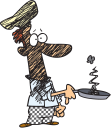 |
| There are more cool stuff you can use here on ClipArt Pal. |
That's why I want to share with you some tips that hopefully will get you to be friends with the kitchen. Perhaps these may save you from encountering the horror stories I experienced before.
1. Read the whole recipe first before proceeding.
You can't just open your recipe book and read it only during the time you're cooking it. You don't want to make the mistake of "adding the peppers" right on the moment before you read the instruction "after 2 hours of simmering the beef". Reading the recipe beforehand ensures that you have all the ingredients, you know how long it will take to cook, and how exactly to execute it.
Also, it will give you an idea of how difficult it is. It is better that you are prepared mentally and emotionally for the pressure of a certain recipe. Now you may be saying, "Aww c'mon. You're exaggerating. So are you a counselor now, talking about emotions and pressure?" Yep guys. Cooking for the first time is a real pressure. You spent money for your ingredients, time and effort and I am sure you are also bent on pleasing your family. Believe me, I have seen mothers who had shed tears over a spoiled Chop Suey or dry Fried Chicken. Even I cried over some meals that turned out to be a failure!
2. Never ever leave what you are cooking.
Sometimes we get cocky and we feel like we have an impeccable sense of time. So, if some stew needs to simmer, or if we're boiling a pot of beans, we just go and leave to buy an item from the community store or probably go online and check if there is any new entry from my blog (haha). I did that several times before, telling myself that I already learned my lesson, I will remember this time. Well, I did not. So either the pot boiled over or worse, it boiled dry! The horror!!! It is already bad enough when you leave something boiling but it's even worse when you leave your saute! Even if it is going to take a long time to stew something, it is always safe to use a timer if you can't help but leave your dish cooking on the stove.
3. Always season little by little.
You can imagine my dismay when I found out that my pasta sauce was as salty as the Dead Sea! I was feeling a bit chirpy and confident while I was doing a Creamy Mushroom Sauce for my fettuccine so without thinking, I carelessly dumped my typical amount of salt to the sauce without tasting it first. After stirring a bit, that's the only time I had the sense to taste it and to my horror, it was too salty!!! Grrr! (Those are the moments that it will dawn on you that you used condensed mushroom soup earlier, hence, it is already seasoned well).
So learn from me. Whether it is sugar, salt, slurry, water or any spice that you want to add to your dish, check it first before doing so. And then, check it again after so you'll know if it is already seasoned just right. And I repeat, do it a little at a time.
4. It is always safe to be on medium heat.
Turning the heat too high will cause food to burn quicker on the outside while the inside is still raw. That will make a really bad fried chicken. Also, it may cause your creamy soups and stews to burn and encrust at the bottom of your pan. Use high heat only when you are bring something to a boil then turn it back to medium heat after it has reached boiling point. High heat is also used in sautes and stir-fry cooking because usually, the pieces are small and the dish is cooked quickly.
5. Prepare everything before starting.
I don't think I need to explain this. Sometime, you feel like you can do what Jamie Oliver is doing, talking while cutting some zucchini, while his onions are sauteing in the pan. He's Jamie Oliver, he's like a demi-god of cooking already and we are mere mortals in our little kitchen. So do yourself a favor, prepare everything first, ensuring that all ingredients are available and are cut up accordingly. This will make your early days of cooking as painless and as fulfilling as it can be.
So, are you ready to take on the world of good food? Come on! It's gonna be okay. We leave the kitchen with a few battle scars here and there but hey. Good food made by your own hands is a reward in itself.
Now for the veterans, I may have left out something. Do you have any other tips you can share? :-D
haha, the too salty thing happened to me ate! i oversalted my fresh cream dory so i had to boil it away in water and drain etc.
ReplyDeletemy first time cooking, my dad rejected a piece of fried chicken that i was too lazy to marinate :P
not to mention the burnt stuff, haha.
but now i think i can make a decent meal. mabagal nga lang hehehe.
cant ever take for granted checking the recipe. once i thought i knew how to make a pancake so didnt check na but turns out i forgot the egg lol. weird, i know! but i ate it and survived to tell the tale.